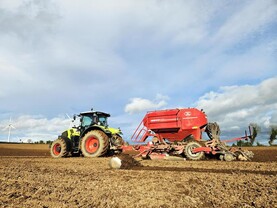There is expected to be a burst of fertiliser spreading activity next week as high pressure becomes established, resulting in drier, sunnier weather.
The Irish Farmers Journal carried out a fertiliser price survey of merchants and co-ops to establish if any change in price has developed. The results of the survey are shown in Table 1.
Quoted prices have not shifted since our last survey, but we understand there are deals being done, with discounts of €20 to €30/t available.
An industry spokesperson said international prices have remained firm for CAN, phosphate and potash, despite claims that prices were decreasing.
What is happening, he suspects, is that merchants have a lot more fertiliser in stock than usual and are willing to do deals to convert it to cash again.
So far, this year the demand has not been huge. One merchant believes this is due to the prevalence of low emission slurry spreading systems, such as trailing shoes, reducing nitrogen losses during spreading.
However, in general, it is more likely a lot of farmers held off spreading to get through high grass covers first.
Spreading charges
The bulk spreading service provided by some merchants and co-ops continues to gain traction and is becoming widely available.
As the service evolves, the way it is being charged to farmers is also evolving. We understand the majority continue to charge on a per-tonne basis. Charges vary from €30/t to €35/t spread, on top of the cost of the fertiliser.
Some merchants offer reductions of €5 to €10/t for the fertiliser itself when spread this way, as fertiliser can be sourced at a bulk discount.
However, more merchants and co-ops that provide the service are upgrading their rules to combat loss of productivity if spreading low rates per acre. For example, one merchant said that the price of €30/t is only available when spreading two bags per acre or more. He said under this rate, the price has to be reviewed and there could be a per-acre charge. Another merchant is operating on a per-hour charge (total equals whatever the fertiliser type per tonne is, plus a €60/hour charge), which could be a more cost-effective option for some.
The merchant says when they are bulk spreading with no hold-ups, they can spread 4.5t/hour on silage ground. He said on paddocks it can take longer, but farmers can speed the process up by having wires opened at paddock entrances and giving clear instructions.






 This is a subscriber-only article
This is a subscriber-only article










SHARING OPTIONS: